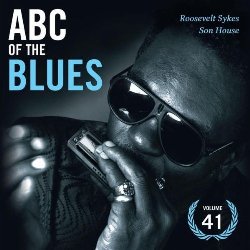ABC Of The Blues CD41 (2010)
ABC Of The Blues CD41 (2010)

CD 41 – Roosevelt Sykes & Son House 41-01 Roosevelt Sykes – 44 Blues 41-02 Roosevelt Sykes – Under Eyed Woman 41-03 Roosevelt Sykes – Knock Me Out 41-04 Roosevelt Sykes – Trouble and Whiskey play 41-05 Roosevelt Sykes – Sykes Advice Blues 41-06 Roosevelt Sykes – Training Camp Blues 41-07 Roosevelt Sykes – Sugar Babe Blues 41-08 Roosevelt Sykes – Jiving the Jive 41-09 Roosevelt Sykes – Little Sam 41-10 Roosevelt Sykes – The Honeydripper 41-11 Son House – Am I Right or Wrong 41-12 Son House – The Pony Blues play 41-13 Son House – Walkin’ Blues 41-14 Son House – Depot Blues 41-15 Son House – Country Farm Blues 41-16 Son House – The Jinx Blues 41-17 Son House – Levee Camp Blues 41-18 Son House – Special Rider Blues 41-19 Son House – Low Down Dirty Dog Blues 41-20 Son House – American Defense
Next time someone voices the goofball opinion that blues is simply too depressing to embrace, sit 'em down and expose 'em to a heady dose of Roosevelt Sykes. If he doesn't change their minds, nothing will. There was absolutely nothing downbeat about this roly-poly, effervescent pianist (nicknamed "Honeydripper" for his youthful prowess around the girls), whose lengthy career spanned the pre-war and postwar eras with no interruption whatsoever. Sykes' romping boogies and hilariously risqué lyrics (his double-entendre gems included "Dirty Mother for You," "Ice Cream Freezer," and "Peeping Tom") characterize his monumental contributions to the blues idiom. He was a pioneering piano pounder responsible for the seminal pieces "44 Blues," "Driving Wheel," and [&"Night Time Is the Right Time.]
Sykes began playing while growing up in Helena. At age 15, he hit the road, developing his rowdy barrelhouse style around the blues-fertile St. Louis area. Sykes began recording in 1929 for OKeh and was signed to four different labels the next year under four different names (he was variously billed as Dobby Bragg, Willie Kelly, and Easy Papa Johnson)! Sykes joined Decca Records in 1935, where his popularity blossomed. After relocating to Chicago, Sykes inked a pact with Bluebird in 1943 and recorded prolifically for the RCA subsidiary with his combo, the Honeydrippers, scoring a pair of R&B hits in 1945 (covers of Cecil Gant's "I Wonder" and Joe Liggins' "The Honeydripper"). The following year, he scored one more national chart item for the parent Victor logo, the lowdown blues "Sunny Road." He also often toured and recorded with singer St. Louis Jimmy Oden, the originator of the classic "Going Down Slow."
In 1951, Sykes joined Chicago's United Records, cutting more fine sides over the next couple of years. A pair of Dave Bartholomew-produced 1955 dates for Imperial in New Orleans included a rollicking version of "Sweet Home Chicago" that presaged all the covers that would surface later on. A slew of albums for Bluesville, Folkways, Crown, and Delmark kept Sykes on the shelves during the '60s (a time when European tours began to take up quite a bit of the pianist's itinerary). He settled in New Orleans during the late '60s, where he remained a local treasure until his death.
Precious few pianists could boast the thundering boogie prowess of Roosevelt Sykes, and even fewer could chase away the blues with his blues as the rotund cigar-chomping 88s ace did. ---Bill Dahl, AMG
Eddie James "Son" House, Jr. (March 21, 1902 (?)[1][2] – October 19, 1988) was an American blues singer and guitarist. House pioneered an innovative style featuring strong, repetitive rhythms, often played with the aid of slide guitar, and his singing often incorporated elements of southern gospel and spiritual music. House did not learn guitar until he was in his early twenties, as he had been "churchified", and was determined to become a Baptist preacher. He associated himself with Delta blues musicians Charlie Patton and Willie Brown, often acting as a sideman. In 1930, House made his first recordings for Paramount Records during a session for Charlie Patton. However, these did not sell well due to the Great Depression, and he drifted into obscurity. He was recorded by John and Alan Lomax for the Library of Congress in 1941 and '42. Afterwards, he moved north to Rochester, New York, where he remained until his rediscovery in 1964, spurred by the American folk blues revival.
Over the next few years, House recorded several studio albums and went on various tours until his death in 1988. His influence has extended over a wide area of musicians, including Robert Johnson, John Hammond, Alan Wilson (of Canned Heat), Bonnie Raitt, The White Stripes, and John Mooney. House's innovative style featured strong, repetitive rhythms, often played with the aid of a bottleneck, coupled with singing that owed more than a nod to the field hollers of the chain gangs.
House was the primary influence on Muddy Waters and also an important influence on Robert Johnson. It was House who, speaking to awe-struck young blues fans in the 1960s, spread the legend that Johnson had sold his soul to the Devil in exchange for his musical powers.








